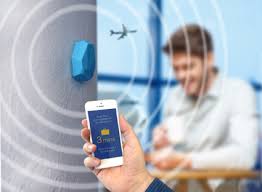As reported by GulfNews: SITA, air transport IT and
communications specialists, is set to roll out mobile phone friendly
beacons at 10 global airports, including airports in the Middle East, over the
next 12 months that will streamline passenger airport experiences.
SITA is in talks with “major
hubs in Europe, United States, Asia and the Middle East,” said Kevin
O’Sullivan, Lead Engineer at SITA Lab, an innovation division.
O’Sullivan was speaking at a press conference on the sidelines of the SITA Air Transport IT Summit in Brussels on Wednesday.
 The beacons use Bluetooth low energy
technology (BlE) that transmit signals that can be received by iPhone
IOS 7 and later software and newer Android models.
The beacons use Bluetooth low energy
technology (BlE) that transmit signals that can be received by iPhone
IOS 7 and later software and newer Android models.
 American is confident the
beacons will improve passenger experiences and lower costs and will roll
it out to the general public in the next quarter through an integrated
application, Easter said.
American is confident the
beacons will improve passenger experiences and lower costs and will roll
it out to the general public in the next quarter through an integrated
application, Easter said.
Passengers will be able to
download airline specific mobile applications that connect with the
beacons. The application will provide passengers with directions, walk
times to gates, lounge access and boarding alerts by using the beacon
signals to locate where the passenger is in the airport.
The beacons can transmit signals to mobile devices that are up to a kilometer away.
SITA also announced on
Wednesday it is launching the Common-use Beacon Registry that will set
an industry standard by defining data sets and beacon types to be
positioned at airports.
Six-month trial
American Airlines is spearheading the rollout of the technology with a 180-day trial in conjunction with SITA at Dallas Forth Worth International where beacons have been placed throughout Terminal D.
American Airlines is spearheading the rollout of the technology with a 180-day trial in conjunction with SITA at Dallas Forth Worth International where beacons have been placed throughout Terminal D.
American and SITA have been
testing beacons for the past nine months and is using a brand called
StickNFind that is slightly larger than a Dh1 coin. SITA and American
Airlines did not disclose the costs of the trial. However, Phil Easter,
American Airlines Director of Mobile Apps, said that each device, with a
battery lifespan of up to five years, costs about $10.
He added, that 65% of
American Airlines’ passengers arrive at the gate early because they are
“scared” of missing their flight. He also said that many complaints
from passengers are because they did not hear that the boarding gate had
changed.
Airlines have to unload
passenger baggage if the passenger misses the flight, which can cause
roll on delays that disrupt the networking and ultimately increase
costs.
Privacy
The beacon passenger location
technology raises concerns over passenger privacy. The beacons do not
transmit data, just a signal to the passengers mobile device, however,
airlines will be able to collect data through the application.
It is unlikely there will be
an airline beacon app, rather the feature will be tied into a passengers
existing airline application that they use to track membership points,
flight details and to make bookings.
However, Easter dismissed
concerns and said that American will not be tracking passenger movement.
He added that it is “opt-in” technology that passengers elect to use.
The feature will not work unless the passenger has downloaded the
application.

No comments:
Post a Comment